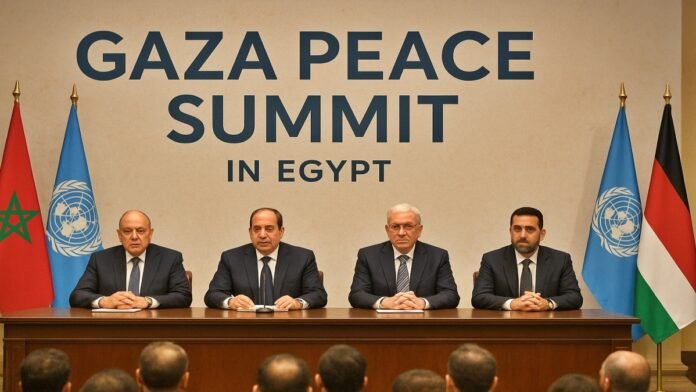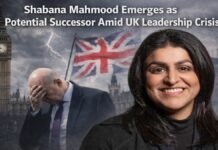
Key Points
- Minister of State for External Affairs Kirti Vardhan Singh, representing India at Gaza Peace Summit in Sharm el-Sheikh as India’s special envoy
- PM Modi received last-minute invitation on Saturday from US President Trump and Egyptian President al-Sisi for the October 13 summit
- Decision to send Singh instead of PM Modi influenced by Pakistan PM Shehbaz Sharif’s expected attendance
- Summit aims to finalize agreement ending Gaza War and implement second phase of Trump’s peace plan
- Over 20 world leaders participating including UK PM Keir Starmer, French President Macron, UN Secretary-General Guterres, and German Chancellor Merz
- Ceasefire between Israel and Hamas has held for four days, with hostage-prisoner exchange scheduled for Monday morning
- Neither Israel nor Hamas attending the summit; Palestinian Authority also absent
New Delhi: India is participating in the historic Gaza Peace Summit being held in Sharm el-Sheikh, Egypt, on Monday, October 13, 2025, with Minister of State for External Affairs Kirti Vardhan Singh representing the nation as Prime Minister Narendra Modi’s special envoy. The high-stakes diplomatic gathering, co-chaired by US President Donald Trump and Egyptian President Abdel Fattah al-Sisi, brings together leaders from more than 20 countries to finalize an agreement aimed at ending the devastating Gaza War that began in October 2023.
Strategic Decision Behind India’s Representation
Prime Minister Modi received a last-minute invitation on Saturday from both President Trump and President al-Sisi to attend the Sharm el-Sheikh summit. However, the Indian government made a strategic decision to send Kirti Vardhan Singh as the special representative rather than having the Prime Minister attend personally. According to sources cited by The Indian Express, this decision was influenced by the fact that Pakistani Prime Minister Shehbaz Sharif was also expected to attend the summit.
Diplomatic sources revealed that Delhi did not want to take chances on how the situation would unfold with Trump and Sharif at the same venue, particularly given the unpredictable dynamics that could emerge from such a high-profile gathering. Singh announced his arrival on the social media platform X late Sunday night, posting: “Arrived in the historic city of Cairo as special representative of Prime Minister Narendra Modi to attend the Gaza Peace Summit at Sharm el-Sheikh”.
Summit Objectives and Framework
The Sharm el-Sheikh Peace Summit is designed to finalize an agreement ending the Gaza War and rally international support for the second phase of President Trump’s comprehensive peace plan. According to the Egyptian Presidency’s statement, the summit seeks to end the ongoing conflict in the Gaza Strip, advance peace efforts, and usher in a new phase of regional stability and security in the Middle East.
The gathering follows the implementation of the first phase of the Gaza peace plan, which resulted in a ceasefire agreement between Israel and Hamas on October 8, 2025, with hostilities officially ceasing on October 10, 2025. President al-Sisi’s office stated that the summit aims “to end the war in the Gaza Strip, enhance efforts to achieve peace and stability in the Middle East, and usher in a new era of regional security and stability”.
The Egyptian Foreign Ministry indicated on Sunday that a “document ending the war in the Gaza Strip” was expected to be signed during or following the summit. The second phase of Trump’s peace plan focuses on disarming Hamas and creating a new governing body in the Gaza Strip, requiring extensive international coordination and support.
Global Leadership Participation
The summit has attracted participation from a diverse array of world leaders, underscoring the international community’s commitment to resolving the Gaza conflict. British Prime Minister Keir Starmer, Italian Prime Minister Giorgia Meloni, French President Emmanuel Macron, German Chancellor Friedrich Merz, Spanish Prime Minister Pedro Sanchez, and Turkish President Recep Tayyip Erdogan are among the prominent attendees.
UN Secretary-General Antonio Guterres is also participating in the Sharm el-Sheikh Summit for Peace, with his office confirming his travel to Egypt for the Monday meeting and expected return to UN Headquarters on Wednesday. The presence of such a wide range of international leaders demonstrates the global significance of the peace process and the urgency to establish lasting stability in the region.
Ceasefire Implementation and Hostage Exchange
A ceasefire between Israel and Hamas has been successfully held for four consecutive days as of Monday morning, ahead of the scheduled summit. The agreement, reached after three days of intensive negotiations in Sharm El Sheikh between the two sides mediated by Egypt, Qatar, Turkey, and the United States, represents a significant breakthrough in ending the conflict.
Hamas announced that the release of hostages would begin Monday morning, before the summit commences. The Palestinian group has agreed to release 20 living Israeli hostages on October 13, along with the remains of 28 others. In exchange, Israel is set to free approximately 2,000 Palestinian prisoners, including minors and those serving long sentences. This prisoner-hostage exchange represents a critical component of the first phase of the peace agreement.
Humanitarian aid deliveries have resumed through the Rafah crossing, with hundreds of trucks carrying food and medical supplies entering Gaza each day under Egyptian coordination. President Trump, speaking to reporters aboard Air Force One while departing for Israel and Egypt, expressed optimism about the situation, stating: “The war is over” and adding, “I think it’s going to normalise”.
Key Issues and Expected Outcomes
The summit is expected to focus on resolving key issues that remain unresolved after the ceasefire implementation. Detailed discussions are anticipated regarding reconstruction efforts in Gaza, ensuring sustained humanitarian access to the devastated territory, and providing regional security guarantees that can prevent future conflicts. According to AFP reports, leaders may outline mechanisms to monitor compliance with the peace agreement, coordinate international assistance for Gaza’s rebuilding, and deliberate on governance structures for Gaza once hostilities have permanently ceased.
The formal declaration expected from the summit would include commitments from participating states to support rebuilding efforts and provide financial and technical assistance for Gaza’s reconstruction. These commitments are essential for transforming the ceasefire into a durable peace that addresses the root causes of the conflict and creates conditions for long-term stability.
Notable Absences from Summit
Despite the broad international participation, neither Israel nor Hamas will take part in the Sharm el-Sheikh summit. Hamas political bureau member Hossam Badran explained to AFP that the organization would not attend as it had “acted principally through Qatari and Egyptian mediators” during the peace talks. Israel has also not been invited to the meeting, reflecting the summit’s focus on international coordination rather than direct negotiations between the conflicting parties.
The Palestinian Authority is also not attending the summit, representing another significant absence from the diplomatic gathering. These absences highlight the complexity of the peace process and the reliance on international mediation and support to sustain the fragile ceasefire and implement subsequent phases of the peace plan.
India’s Strategic Interests and Regional Role
For India, participation in the Gaza Peace Summit represents an opportunity to demonstrate its presence and influence in Middle East diplomacy. The summit allows India to showcase goodwill towards the Palestinian cause while simultaneously boosting bilateral relations with Egypt, a key regional partner. India’s involvement also reflects its broader strategic interest in maintaining stability in the Middle East, a region critical for energy security and home to millions of Indian expatriates.
Prime Minister Modi had welcomed the agreement on the first phase of President Trump’s peace plan immediately after it was announced on October 9. In a post on his official X handle, PM Modi stated: “We welcome the agreement on the first phase of President Trump’s peace plan. This is also a reflection of the strong leadership of PM Netanyahu. We hope the release of hostages and enhanced humanitarian assistance to the people of Gaza will bring respite to them and pave the way for lasting peace”.
Modi also revealed that he spoke to his “friend” Trump after the ceasefire agreement and congratulated him on the “success of the historic Gaza peace plan”. This personal engagement between the two leaders underscores India’s commitment to supporting international peace efforts and maintaining strong diplomatic ties with the United States.
Regional Security and Stability Prospects
The Sharm el-Sheikh summit comes at a critical juncture for Middle East peace and security. According to the Egyptian Presidency spokesperson, the gathering reflects “US President Donald Trump’s vision to achieve peace in the region, and his relentless quest to end conflicts around the world”. The summit’s success could set a precedent for resolving other regional conflicts and establishing new frameworks for cooperation and security in West Asia.
The international community’s unified presence at the summit signals strong support for ending the Gaza conflict and preventing its escalation into a broader regional war. With the ceasefire holding and initial steps of the peace plan being implemented, there is cautious optimism that this diplomatic effort could mark a turning point in one of the world’s most intractable conflicts. However, the complex political dynamics, deep-rooted grievances, and competing regional interests mean that sustained international engagement and support will be essential for achieving lasting peace and stability in Gaza and the broader Middle East region.












































